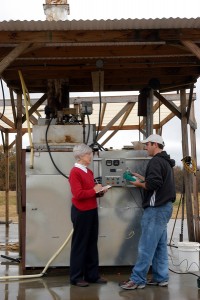The biological engineer brings engineering to life; this major integrates the principles of biological and physical sciences and uses them to solve problems. Students learn to analyze and develop solutions to unique engineering problems of biological and agricultural systems. Scientific and engineering principles are applied to problems in concentration areas such as biomechanical applications; management of soil and water resources; processing and marketing of food and fiber; and machines, controls, and structures for biological and agricultural systems.
The Biological Engineering degree has three concentration areas Agricultural, Bioprocessing, Ecological and Environmental. The program places emphasis on basic science and engineering courses, such as mathematics, physics, chemistry, mechanics, biology, materials, and thermodynamics, providing a solid foundation for application of engineering principles to biological systems.
The Agricultural Engineering Concentration offers career opportunities in power and machinery systems, farm structures and climate control. Positions are in manufacturing and processing companies where a knowledge of machinery and power systems, structural design, mechanical analysis or ventilation and climate control is needed.
The Bioprocess Engineering Concentration includes not only food engineering courses, but is broader and includes post-harvest handling and processing of crops before they reach the processing plant. The increasing emphasis on food quality, safety, and the trend in our society to use more processed foods is generating many employment opportunities for graduates of this area.
The Environmental Engineering Concentration offers a wide variety of career options. The study of rural and agricultural soil-water-environmental engineering is unique to this program. However, many of the principles of water management, soil management, and pollution control apply to urban problems as well.
The Ecological Concentration includes courses in ecology and ecological engineering.
Courses include:
Transport Phenomena, Fluid Mechanics, Solid Mechanics, Properties of Biological Engineering Materials, Bioinstrumentation, Engineering Design I, Engineering Design II
Additional Information:
In’s and Out’s of Engineering CODA
Video-Engineering Majors Exploration
Video-The Creativity of Engineering at NC State
14 Grand Challenges for Engineering
| College | |
| Discipline |
|
| Academic Department | |
| Departmental Contact | |
| Major Overview | |
| Plan Requirements | |
| Semester Sequence | |
| Related Majors | |
| Skills You Could Develop |
|
| Learn More About This Major | |
| Career Titles | |
| Learn More About Careers |
